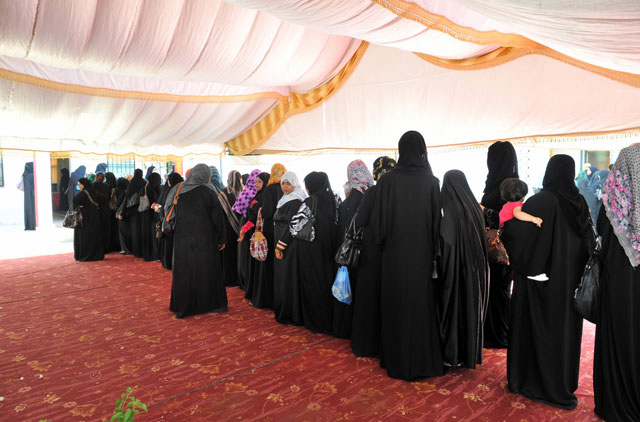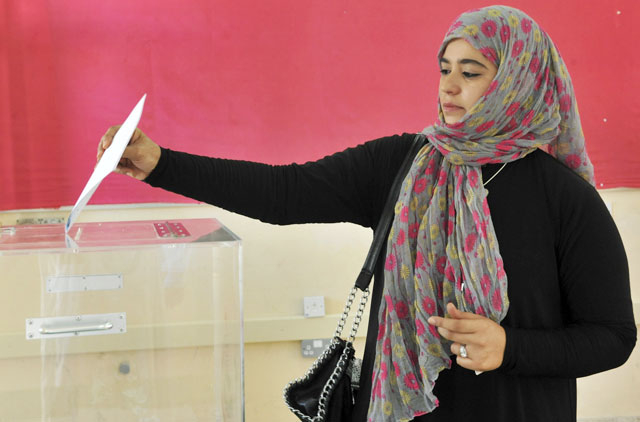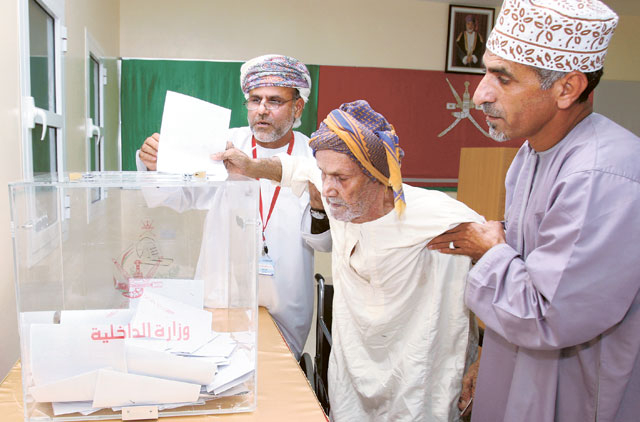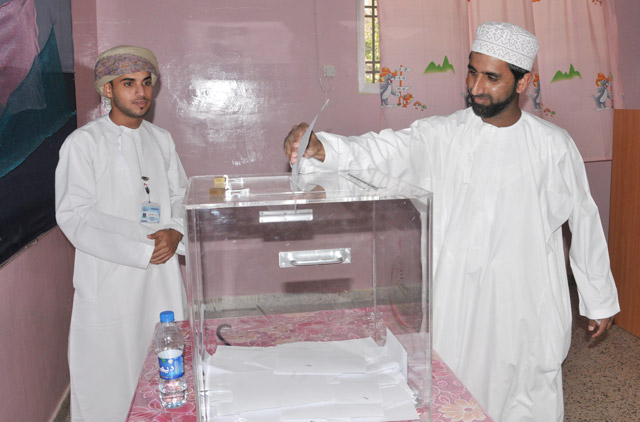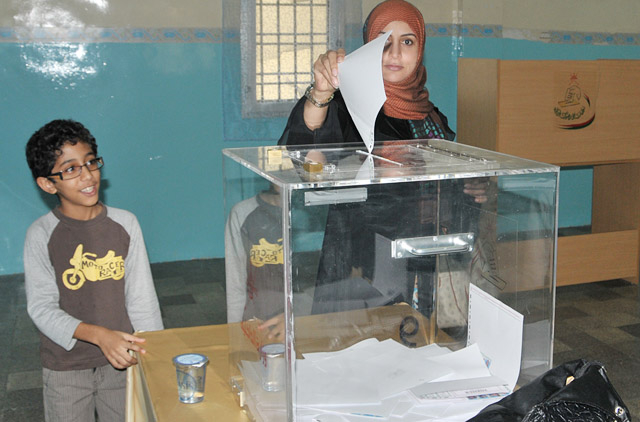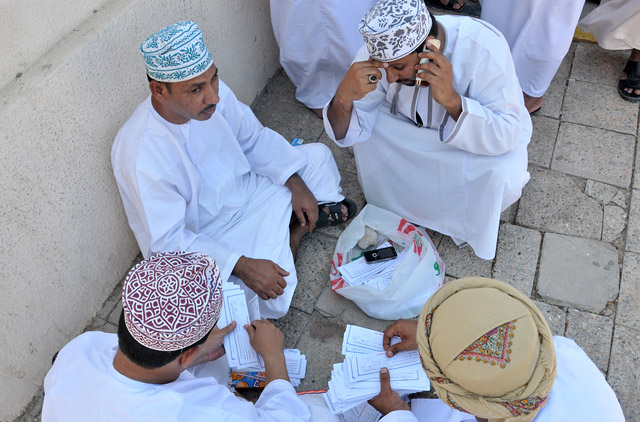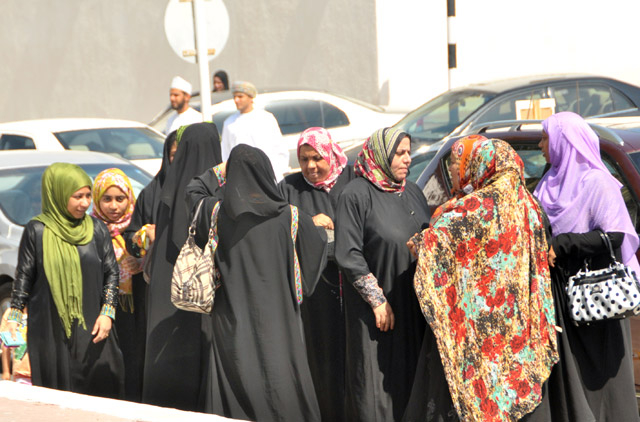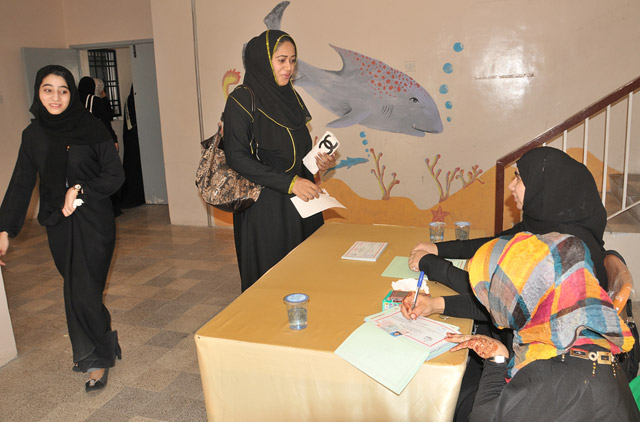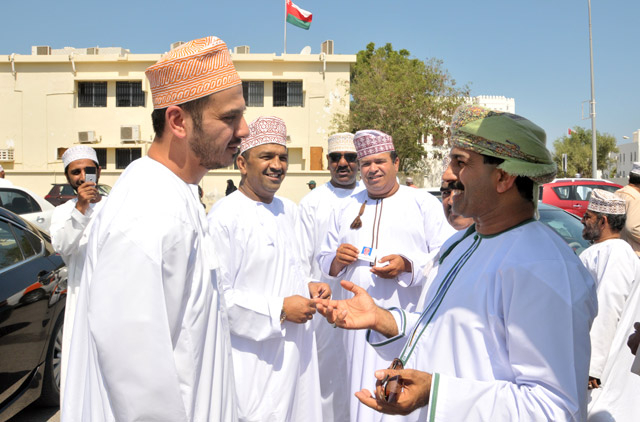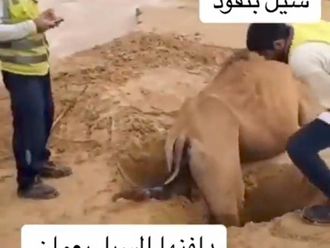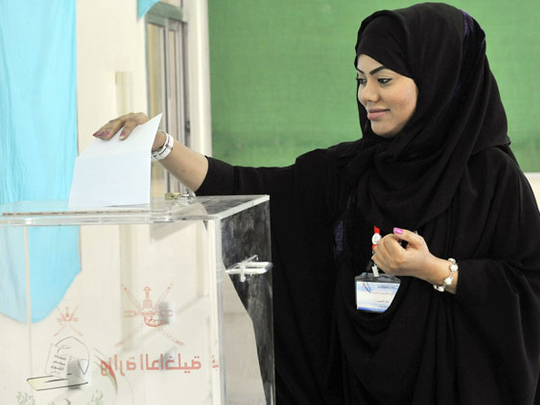
Muscat: Despite small glitches a large number of voters, especially women, queued up at polling stations across the country from early morning as authorities expected more than 70 per cent voting at the end of the polls for the seventh term of Oman's Majlis Asshura.
In pictures: Oman's Majlis Shura elections
"Looking at the response since the morning, we reckon more than 70 per cent voting for the poll at the end of the day at 7pm," Sayyid Mohammed Bin Sultan Al Busaidi, Undersecretary at the Minister of Interior, told Gulf News after casting his vote at the Jabber Bin Zaid School Saturday afternoon.
He said that he was in constant touch with the other constituencies and was pleased with the response this time at Seeb and Sohar. "Seeb has seen much more turnout this time than the previous elections (in 2007)," he said.
In reply to a question, he said that the Election Commission had expected good turnout at Sohar and as expected voting was good in the northern industrial port town, which in recent times has seen protests that have turned violent at times.
"People in Sohar want to change their representatives (to Shura)," he said justifying the bigger turnout in the biggest town in Batinah region.
Salalah
The response to elections down south in Salalah, which also saw series of protests against alleged corruption and unemployment, was encouraging.
Shaikh Mohammed Bin Marhoon Al Maamari, Minister of State and Governor of Dhofar, expressed satisfaction at the manner in which the election moved in the region. He praised the response from the voters in the entire region, including Salalah, where about 24,000 registered voters will pick two candidates from 32, including four women, in the fray.
"The competition was always tough and now it is getting even more fierce," Khalid Al Haribi, a candidate from Salalah, told Gulf News by phone from the southern town located over 1000-km south of Muscat.
Although there are 32 candidates listed on the official ballot paper, ten of the candidates have withdrawn in support of the other candidates.
"Some people may vote for the ones who are not in the race but bulk SMS have been sent about their withdrawal to the voters as they now support other candidates," Al Haribi said, adding that the unofficial withdrawal after the official withdrawal deadline had made the competition stiffer.
In his opinion the voting would be much higher in Salalah compared to the 2007 elections. "It is a tough call and every candidate is trying to grab the last few yards in the race," he said.
Optimism
The candidates are not permitted to be present at the polling centres but their teams of volunteers can be present there to assist voters but cannot campaign.
Nabil Al Raisi, one of the campaign managers for Adil al Raisi from Muscat constituency, was camping outside the Al Zuhoor School in the old town and sounded optimistic about the overall voter turnout.
"Excellent facilities are provided this time with at least five classrooms made available to place ballot boxes," he said while praising the conduct of the elections.
He pointed out that since morning a big number of voters in Muscat turned up to exercise their franchise. "We expect the voting gather further momentum in the evening and it would be much more than 50 per cent of the 12,000 registered voters," he said optimistically.
Muscat votes
The Deputy Wali of Muscat, Sayyid Mohammed Bin Ahmed Bin Nasser Al Busaidi, also revealed that the response at both the polling centres in Muscat was encouraging. "The women have so far outnumbered men during the morning voting in Muscat," he added.
According to reports a number of ministers turned up, like ordinary citizens, to cast their votes. "The ministers are also citizens and have their right to vote," pointed out Al Haribi.
Among the voters in Muscat was former health minister and the current Deputy Chairman of the Board of Governors of the Central Bank of Oman (CBO), Dr Ali Bin Mohammed Bin Moosa.
"I am glad to be part of this process, which is also very important in the history of our country," he told Gulf News soon after exercising his suffrage at the Al Zuhoor School in old Muscat town.
"We all Omanis must participate in this process to express our views about what is happening in Oman," the soft-speaking senior citizen said.
Ground reality
Some of the voters were of the opinion that the protests in the country in the recent past had brought to the fore the needs of the people and could have an impact on how Shura functions henceforth.
"The protests has had brought changes with some of the Shura members being picked by the leader as ministers and hopefully the new Shura will have a better role to play for the benefit of the citizens," said Amal Bint Hilal Al Hashmi, who teaches English at a private school.
She said that she didn't believe in gender bias. "I have voted for a man because I have faith in his ability to do something for us in the Shura," she said.
Faiza Al Hamdadani also voted for a man. "None of the two women candidates asked me to give my vote to them so I gave it to someone I know," she said, adding that her vote went to a known candidate, who also has quality to stand for people.
"It (Shura) will be very much different this time after what happened (protests) in Sohar and other places in recent times," said Faiza, who is a qualified engineer with the Omantel.
"Inshallah these people (elected representatives) will do a lot of work now in Shura, in peace of course," she hoped.
Hope for a new beginning is the general voice as a large number of people this time have stepped out to vote in country's third open elections to the only elected advisory council that is expected to get more teeth this time.


